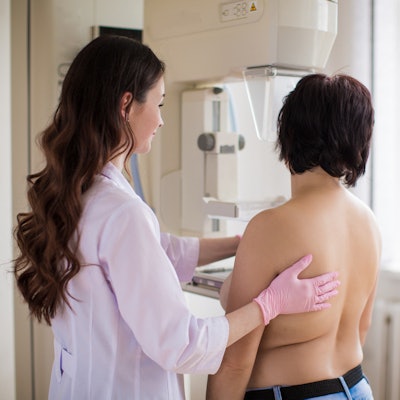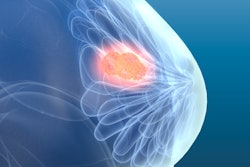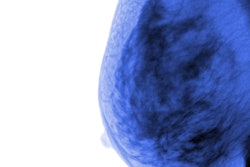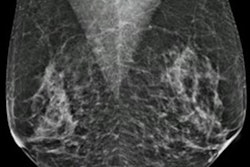
Researchers are highlighting an imaging-based risk model that could identify women who may benefit from supplemental breast screening, according to a study published March 17 in the Journal of Clinical Oncology.
A team led by Mikael Eriksson, PhD, from Karolinska Institutet in Solna, Sweden, reported that their model outperformed the Tyrer-Cuzick version 8 model for both short-term and long-term risk assessment of breast cancer.
"An image-based risk model developed for short-term risk to identify women who may benefit from supplemental screening can also be used to assess long-term risk for identifying women who may benefit from primary prevention," Eriksson and colleagues wrote.
As breast cancer screening becomes more personalized, there is a need for improved risk assessment models that can help with primary prevention and treatment strategies. While artificial intelligence (AI) risk models derived from imaging show high discriminatory performance compared to traditional models, the researchers pointed out that the performance of these models has only been assessed for women at short-term risk.
Eriksson and colleagues wanted to assess both the long- and short-term performances of an image-based risk model, as well as compare them to those of the Tyrer-Cuzick v8 risk model. It used an independent set of baseline mammograms from the same underlying screening cohort that was used to develop the model.
The model itself is a two-year risk model designed for women attending biennial breast cancer screening. It uses image-derived data to predict the risk of being diagnosed with a symptomatic cancer or a cancer at the next routine screening, and it is available for clinical use in the U.S. and Europe.
For the study, the researchers tested the model on 8,604 randomly selected women ages 40 to 74 years from the KARolinska MAmmography Project for Risk Prediction of Breast Cancer (KARMA) screening cohort. The cohort began in 2010 and included 2,028 incident breast cancers diagnosed before May 2022.
The team found that the risk model had better discriminatory performance over the Tyrer-Cuzick v8 model on both one- and 10-year follow-up, showing overall higher area under the curve (AUC) values.
| Performance of image-based risk model vs. Tyrer-Cuzick v8 | ||||
| Characteristic | Tyrer-Cuzick v8 | Image-based risk model | ||
| Year 1 | Year 10 | Year 1 | Year 10 | |
| Overall | 0.62 | 0.60 | 0.74 | 0.65 |
| Premenopausal women | 0.61 | 0.56 | 0.69 | 0.62 |
| Postmenopausal women | 0.66 | 0.62 | 0.76 | 0.66 |
| High breast density | 0.58 | 0.56 | 0.69 | 0.64 |
| Low breast density | 0.64 | 0.60 | 0.75 | 0.64 |
| With family history | 0.52 | 0.56 | 0.65 | 0.62 |
| Without family history | 0.61 | 0.58 | 0.75 | 0.66 |
The researchers reported that when comparing the AUCs of both models at one, two, five, and 10 years of follow-up, the image-based risk model showed significantly higher AUC values across the follow-up periods in range.
The team also found that the image-based risk model showed higher AUCs in the short term, within one to three years of follow-up, with symptomatic and estrogen receptor-negative breast cancers showing the highest point estimates at or above 0.75.
In the long-term, all subtypes showed adjusted AUCs of 0.62 or greater after 10 years of follow-up. However, the image-based risk model had higher AUC values for estrogen receptor-positive, screen-detected, and invasive breast cancers in the long term (p < 0.01).
Finally, the authors found that the proportion of breast cancers identified as high-risk using the image-based risk model was 20%, significantly larger than the corresponding proportion identified using Tyrer-Cuzick at 7.1% (p < 0.01).
While the study indicates that the image-based risk model shows better overall performance, Eriksson and colleagues called for future studies to investigate the addition of lifestyle and familial risk factors, as well as genetic determinants to the image-based risk model.




















